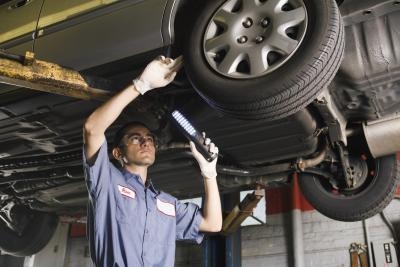
Wheel bearings keep the wheels on a vehicle spinning smoothly and quietly. They are sealed during manufacture of the vehicle, which helps to protect them, but like any automotive part, they will wear out eventually. Worn wheel bearings can be dangerous and should be replaced; a bearing worn badly enough will eventually allow a tire to fall off.
Listen for noises such as snapping and clicking, which can be heard when cornering the vehicle, or a grinding sound, also when turning, or when the vehicle's load shifts. Humming, growling and rumbling noises also may be heard when driving the vehicle straight, with the sound growing louder when the vehicle is turned.
A worn bearing sometimes will cause a wheel to vibrate or wobble. A badly worn wheel bearing may also cause a vehicle to pull to the side, sometimes quite sharply, when the brakes are applied. In such cases, the brakes could also feel like they are pulsating. In a worst case scenario, a worn bearing can damage the sensors on anti-lock braking systems, causing them to fail outright.
A bad wheel bearing can cause a tire to wear out at a much faster rate than normal, particularly if the bearing is extremely worn or loose.
If the wheel bearings check out okay but noise, tire wear or handling issues persist, that doesn't mean there is no problem. These can also indicate other major vehicle defects, such a worn constant velocity joint, damaged tires or a front end that is badly out of alignment.